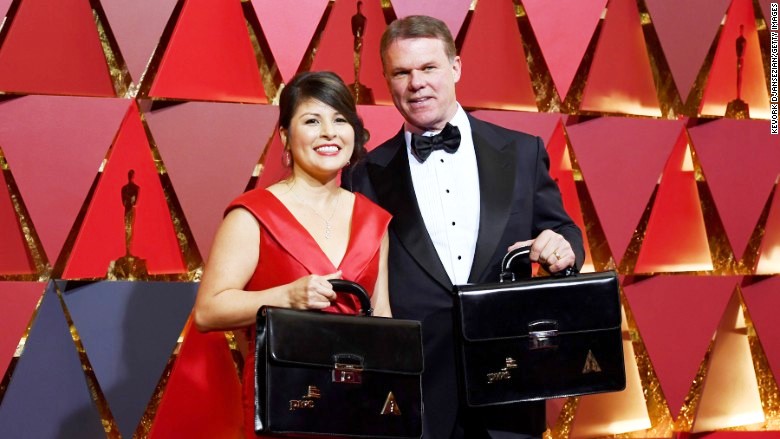
PwC representatives before the mishap. Image source: CNNMoney
As the jokes about the Oscar gaffe continue to circulate, PR crisis management experts ponder if and when accounting firm PwC will recover.
It’s difficult to imagine a more high-profile blunder. As you might know, La La Land mistakenly received the Academy Award for Best Picture at Sunday night’s Oscars. The rightful winner was Moonlight.
A PwC partner handed presenter Warren Beatty the wrong envelop. It was the back-up envelope for Actress in a Leading Role. PwC representatives said they immediately notified people of the mistake. Yet La La Land producers had already delivered acceptance speeches before they learned they were not the real winners.
Quick Reaction not Quick Enough
“It was a little chaotic and just took time to get out onstage and let people know that the mistake was made,” Tim Ryan, U.S. chairman and senior partner of PwC told USA Today. “And unfortunately that took enough time to get through two-and-a-half acceptance speeches.”
PwC – formerly known as PricewaterhouseCoopers — has handled the accounting for the awards since 1934. You would think that after all these years, it would have developed a fool-proof process, especially considering the high-profile nature the awards. The accounting firm gains substantial publicity benefits from working with the Academy.
In a statement, PwC blamed partner Brian Cullinan for handing Beatty the wrong envelop. It also said Cullinan and fellow auditor Martha Ruiz were slow to follow protocols for correcting the mistake. To make matters worse, media reports emerged that Cullinan was tweeting photos of award winners backstage during the show – potentially distracted and possibly violating the Academy’s policy.
PwC’s Reputation Takes a Blow
PR crisis management experts say PwC’s reputation will suffer. Some wonder if the firm will lose its contract.
“They had a pretty simple job to do and messed it up spectacularly,” Nigel Currie, an independent London-based branding specialist, told The Hollywood Reporter. “They will be in deep crisis talks on how to deal with it.”
However, Anthony Sabino, a law professor at St. John’s University’s Peter J. Tobin College of Business, believes PwC will heal from its PR “black eye.”
“While all the facts are not in yet, it would appear to be simple human error,” Sabino told USA Today. “After decades of flawless performance, it was bound to happen eventually. For an event as complex and as secretive as the Academy Awards, PwC’s sterling record still stands out.”
A Reputation Recovery Plan
How can PwC recover? The accounting firm has followed the PR crisis playbook. It has apologized profusely, taken responsibility for the mistake, and vowed to investigate.
Its statement read: “For the past 83 years, the Academy has entrusted PwC with the integrity of the awards process during the ceremony, and last night we failed the Academy.” That phrasing directly accepts responsibility and regret.
“We sincerely apologize to ‘Moonlight,’ ‘La La Land,’ Warren Beatty, Faye Dunaway, and Oscar viewers for the error,” PwC said in its statement. While conveying apologies and regret, the statement could better have conveyed accepting of responsibility by calling the gaffe “our error,” not “the error.”
The Academy’s statement read: “We sincerely apologize … for the error that was made during the award announcement for Best Picture.”
The phrase “error that was made” can be found in many public statements of corporate apology. Many PR crisis management consultants advise against the “was made” construct because it avoids acknowledging direct responsibility. In this case, the Academy was not directly at fault and therefore the phase is appropriate.
The “mistakes were made” phrase was first uttered by Ronald Reagan during a State of the Union broadcast. The president acknowledged that “serious mistakes were made” in dealings with Iran in an attempt to free seven American hostages held in Lebanon. The phrase deflected responsibility from him and his direct reports. Instead of “mistakes were made,” the more active phrase “the error we made” takes direct responsibility for the mistake.
Tim Ryan, U.S. chairman and senior partner of PwC, told USA Today, “At the end of the day, we made a human error.” That statement attempts to minimize the firm’s responsibility and dismiss the seriousness of the blunder.
To continue its recovery, PwC must be as apologetic as possible, take full responsibility, remain fully transparent and take steps to ensure such a mistake won’t happen again, PR crisis management experts say. Doing some penance in the form of community service might also help the firm regain support from Hollywood and the public.
“The spotlight is so big and bright that there is no conceivable way for PwC or the Academy to move forward without being transparent with the public,” Jeremy Robinson-Leon, COO of PR and crisis management agency Group Gordon, told the Los Angeles Times.
Bottom Line: The high-profile blunder at the Academy Awards night substantially damaged PwC’s reputation. The accounting firm may salvage its reputation by following the PR crisis management playbook, but PR crisis management experts disagree over how quickly the firm can recover.
William J. Comcowich founded and served as CEO of CyberAlert LLC, the predecessor of Glean.info. He is currently serving as Interim CEO and member of the Board of Directors. Glean.info provides customized media monitoring, media measurement and analytics solutions across all types of traditional and social media.




